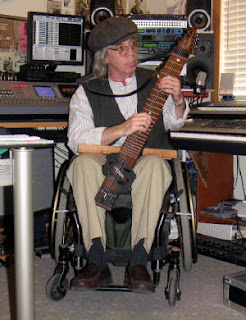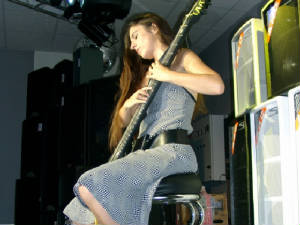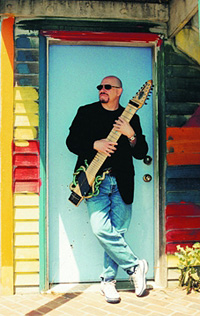SSR Interview with Terry Telson
We invite you to take a trip with us.A trip to a land filled with street corner folk musicians,Flower Power,peace rallies,long hair,Latin rhythms,world beats,and relaxing melodies.
That's quite a mix.
Then again,Terry Telson is quite an artist.With over 30 years of music coursing through his veins,Terry has been painting the aural landscape with his multi-instrument,multi-stylistic vigor.Pour yourself a cup of cyber green tea,light some incense, and let Stickist Terry Telson speak to your soul....
SSR Thanks for spending a little time with us Terry. You've been playing music for over 30 years now. How did ya get started?
I originally started out as a drummer way back in the late 50's all the girls liked the drummers in the bands at that time and I liked girls, so drums it was.Then along came the 60's, protest songs on acoustic guitars. Peace rallies and long hair. Well I thought I had allot to say too and it's pretty hard being a solo act and singing protest songs with drums hence an instrument change to guitar was in order.
It was the early days of the folk music scene in Chicago. Everyone had an acoustic guitar and used to sit around at the parks and play the tunes of the day by Dylan, Guthrie, Baez and so many others. It was at that time I discovered a lyricist in myself. I was plagued by them and still am, with lyrics running through my mind most of the time.
So I put together an act and started doing the coffee houses and clubs. I teamed up with a bass player Ray Teichman and we did the college circuit and clubs all around Chicago. At that time, others that were on the circuit were Steve Goodman, John Prine, Bonnie Koloc, Tom Dundee and Mick Scott all great players, so there was allot of inspiration to hang with it and be part of the then music scene. Ray and I went into the studio and did what was called an EP (extended play) album called "Bounty Man." It had four cuts on it.
I did that up until the mid 70's and decided to head west first stopping in the mountains of Arizona for a couple of years to get my head right and do my first full length 33 1/3 lp album called "While In Exile." When I had enough of clean mountain air I decided California was the place I needed to be to continue my musical journey. First landing in San Francisco and finally in Sacramento, playing in different bands in both places.
I picked up playing the Vibraphone while in San Francisco after seeing a street player down at Fisherman's Wharf playing them. I fell in love with them and so got a set myself. I guess it appealed to the early percussion days in me. I played them in a few different Latin Jazz bands having always been a huge fan of the Latin rhythms, congas and all the different percussive sounds, they can really get a killer groove going with the Latin rhythms.
Finally when I had enough of band dynamics about ten or so years ago, I decided I wanted to paint my own picture. I put together a studio and have barely come out of it since, except to eat once in awhile. It was somewhere in there that I decided I wanted to put together a body of work to leave behind, a certain sense of immortality I suppose. Something that says I was here and this is what I contributed to the arts and the gentler side of life.
SSR When did your association with the Chapman Stick begin?
About three years ago I ran across it on the internet and jokingly said to my wife honey I need one of these things, what is it. At that time they did not have any demos up and so I just blew it off as a hmmmm that's interesting. Then about two years ago I ran into it again on the net and this time they had the demos up of Greg Howard jammin' on it and my jaw dropped. My wife overhearing it playing said what is that? Well the two of us watched the video a few times and the next day I called up and ordered one. From that point on it became my instrument of choice.
SSR Being a child of the 60's really comes through in your music. It is well orchestrated and every song flows with tremendous melody. How has your music changed in the last 25 yrs or so?
Well the folk music had not changed in the basics of it, still acoustic guitar and protesting about one thing or another. What has changed though is that I hope I have gotten better at both the lyrics and the playing of it. What has evolved allot more than that though is my New Age, World Music Jazz instrumentals. I love them, because they allow me to experiment and push to the limits exploring new territory. My Stick has become a great instrument to use in them as well. There is a certain sort of freedom that the Stick allows that no other instrument has,I don't think. I believe it is because of the way the Stick is played. At least for me it does.
SSR On your site you mention wanting to "bring relevant information to the fore front" through music during the late 60's.Do you still feel as strongly today as you did in the 60's?
I'm not sure I ever left the 60's at least not fully. I have a song on my site an autobiographical one called "What Ya' Got To Protest Man." One of the chorus lines is "I believed it then I still believe it now, so why would I leave it all behind." I think that says it all for me. Even in my instrumentals I try to put that same sense relevancy in them, matching the music to the title to deliver the message.
SSR What is your usual routine when writing/recording your music?
That depends on whether it is an instrumental or vocal piece. With vocals as I said I have lyrics running through my head and I either use guitar or keyboard to develop the tune. With instrumentals I usually will sit and play with progressions and licks, then put them to a percussion rhythm to develop them. In either case though I rarely take more than a day or two to write a tune and record it. For me it has always been the tune is either there or it isn't. I loose interest in it if I try to go beyond that.
SSR How much do you compose on the Stick?
It seems to me that there are basically two types of Stick players. The first which encompasses most of the players. They play it more as a solo instrument standing on it's own with the bass and melody. I don't mean to say they don't play in bands but more so that one could easily take the band away and let the Stick carry it all, much like Greg Howard's playing.
The second type which is the way I use my Stick more is that of a lead instrument, something that needs to be backed up with other instruments, to complete the cut. I use the wonder of the technology of keyboards to do that. I guess my use of it falls more into line with my Vibes and guitar playing, both also as lead instruments. Larry Tuttle and Freeway Philharmonic, who is my favorite Stick player and Stick equipped band do it more in this vein.
SSR It certainly appears that you have seen your fair share of clubs. How often do you get to perform nowadays?
I don't perform live anymore for a few reasons. Primarily now what I want to do is record all of the music I have in me, to leave behind. I treat my compositions more like paintings, that is when it's done it's done and once committed to cd I rarely ever physically play it again on any of the instruments. After so many years of memorized tunes and playing them over and over again I prefer not to anymore. What is great about what I am doing now is every day or two starting on a new tune it always stays fresh to me now and I don't tire of them. Every now and again I think maybe I should put another band together......naw, I think I'll just keep doing what I'm doing I love it. Although I ran into a lady violinist recently and we may put something together if for nothing else recording.
SSR I noticed that some of your latest mp3s are from CD #83.That is quite an accomplishment! Have you been able to distribute your music nationally?
What a great invention the internet was for musicians. Not only nationally, but internationally as well. I have many of my cds all over the world and that was only possible with the net. It really has opened up the world literally to many great musicians that otherwise would never have been heard at all. The other thing it has afforded me is to work on a few collaborative compositions and cds with other musicians form around the world. That is very cool.
SSR Tell us about "Club Chops".
Having been part of music forums for allot of years, I was always pretty dissatisfied with their makeup. They are either brand specific or there is a snobbery on them that what and how they are doing their thing is cool and what you are doing is junk. I was pretty fed up with that and decided I wanted a place that was all about the music. It doesn't matter how one gets there or with what, the end result being the important thing. That's what Club Chops is all about, the music. Essentially it's all good there.
The second thing I was getting real bored with was rude behavior on forums and useless feedback comments given from a self serving egotistical point of view. Nothing constructive to say that would help the person to get better just a useless "your stuff is crap" give up music. That isn't happenin' at Club Chops.
SSR O.K. Terry. Here comes the infamous Strada-Sphere "10th Question":
Seeing as how you are a child of the 60's we'll give ya a somewhat relevant question.
Describe what you feel the following folks would have sounded like had they taken up the Chapman Stick...
A. Timothy Leary
Leary would probably be doing some off the wall metaphysical meditation music with his Stick midi'd up to a sitar sound. That is when he was not in a self induced drug coma.
B. Rowan and Martin
They would be doing a political comedy act and instead of "sockin'" it to us, they'd be "Stickin'" it to us.
C. Ritchie Havens
Ah now here's a guy I like allot because his guitar playing was all about a rhythmic percussive sound. Havens would find an innovative way to play an open tuned Stick. He would do some rhythmic chord progression and never touch the bass side.
D. Dick Cavet
Cavet would be doing an Avante Garde classical sort of thing that would only be understood by a very few elitist Stick fans.




Comments